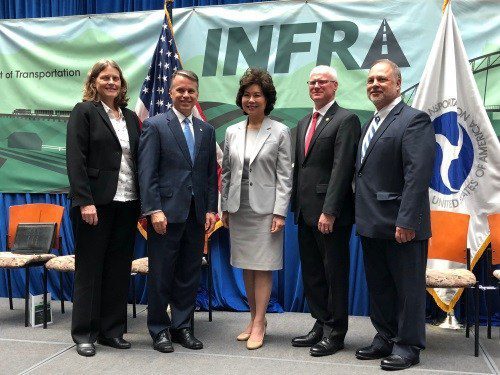USDOT Event Highlights State DOT INFRA Grants

The U.S. Department of Transportation officially awarded nearly $856 million worth of Infrastructure for Rebuilding America or INFRA grants to fund 20 projects across the country during a special event at its Washington, D.C. headquarters on July 25 – with 12 state departments of transportation winning grants for a variety of highway, railroad, and bridge replacement undertakings.
[Above photo left to right: Melinda McGrath, executive director, Mississippi Department of Transportation; Patrick McKenna, director of the Missouri Department of Transportation; U.S. Secretary of Transportation Elaine Chao; Russel McMurry, commissioner for the Georgia Department of Transportation; and John Halikowski, director of the Arizona Department of Transportation.]
This second round of INFRA grants – which follows $1.5 billion awarded last June to 26 transportation projects – now undergoes a 60-day Congressional review period before the money can be released.

“This significant federal investment will improve major highways, bridges, ports, and railroads around the country to better connect our communities and to enhance safety and economic growth,” said Transportation Secretary Elaine Chao (seen at right) in a statement.
Speakers at the event – Secretary Chao, Sen. Roy Blunt, R-Mo., Rep. Sam Graves, R-Mo., Rep. Greg Walden, R-Or., and Russell McMurry, commissioner of the Georgia Department of Transportation – emphasized that INFRA grants play a “vital role” in meeting more rural infrastructure needs, while also allowing states to reallocate more of their own dollars to other transportation projects.

Sen. Blunt and Rep. Graves specifically pointed to the $81.2 million grant being provided to the Missouri Department of Transportation to help defray the cost of “two critical upgrades” along I-70; a $238 million effort that includes replacing the 60-year-old Rocheport Bridge over the Missouri River, now nearing the end of its service life, and building 1.2 miles of east-and west-bound truck “climbing lanes” to improve traffic flow.
“That INFRA grant money will allow Missouri to free up millions of more dollars to invest in other transportation projects across the state,” Rep. Graves said.
The other state DOT projects funded during this second round of INFRA grant awards include:
- The Alabama Department of Transportation: awarded $125 million to construct a new six-lane cable-stayed bridge with more than 215 feet of vertical clearance to carry I-10 across the Mobile River channel.
- The Arizona Department of Transportation: provided with $90 million to add capacity on a rural, mountainous stretch of I-17 north of Phoenix.
- The Maryland Department of Transportation: given $125 million to raise the vertical clearance of the Howard Street Tunnel, Baltimore, to facilitate movement of double-stack trains on an important freight rail corridor.
- The Maine Department of Transportation: awarded $36 million to replace the Madawaska International Bridge, a U.S.-Canada border crossing over the Saint John River.
- The Mississippi Department of Transportation: provided $52.4 million to complete the portion of the Appalachian Development Highway System in Mississippi.
- The Oregon Department of Transportation: given $60.4 million to make a series of improvements to roadways on the north side of Bend.
- The Rhode Island Department of Transportation: awarded over $60.3 million to rebuild the Providence Interstate 95 Northbound Viaduct.
- The Colorado Department of Transportation: provided over $8.2 million to add approximately 12 miles of passing lanes along US 287 in rural southeastern Colorado.
- The South Dakota Department of Transportation: given $13.01 million to support a bridge replacement project over the Missouri River in Pierre.
- The North Central Council of Governments and Texas Department of Transportation: they will share more than $8.7 million in grants to fund a series of seven projects involving seven bridges in the Dallas-Fort Worth area.
- The West Virginia Division of Highways: given $9.4 million for the WV2 Proctor to Kent project.
Nicole Nason, administrator of the Federal Highway Administration, explained to the AASHTO Journal at the event that the “detailed criteria” required to apply for INFRA grants is helping to “sharpen up” the analytics skills of state DOTs, which then provides USDOT with far more “transparent details” regarding the economic benefits of specific transportation projects.

“The grant process gives us a very detailed spreadsheet we can take before Congress during the review period, so we can show precisely why we selected the projects we did,” she said. “It allows us to move from broad, vaguely defined benefits such as ‘reducing traffic congestion’ to more specific criteria, especially in the areas of using innovative materials and quality of life improvements.”
Nason added that improving transparency when comes to INFRA project criteria and the program’s selection process is just one of the recommendations laid out in a recent Government Accounting Office report.
“But it also helps when it comes to explaining why a grant proposal didn’t succeed,” she pointed out. “We have 20 grant winners out there who are very happy, but we also have to go back and explain to 180 others why their applications did not result in grants.”

The INFRA program – established by the 2015 Fixing America’s Surface Transportation or FAST Act – prioritizes freight-related highway projects, though some limited rail and port infrastructure is allowed as long as it reduces congestion on highways.
The law specified that 10 percent of the funds be available for small projects valued at $5 million or more, while large projects must be at least $25 million. Furthermore, at least 25 percent of the overall INFRA grant program funding must go to rural projects.


